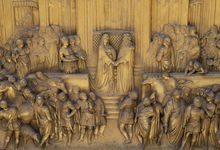Love is all that counts
It was so typical of Peter: he was exuberant, hot-headed, brash, and impertinent. And this time he had really dug himself in deep. So why did Jesus later make him the chief shepherd over His flock? Some observations surrounding the question, “Do you love Me?”

At the start, there was even something amusing about it, for example, when Jesus emerged in the storm and Peter thought he would have to walk on the water too. After only a few steps his courage of faith left him. Jesus’ hand saved him just as he began to sink.
But things became more serious in the Garden of Gethsemane when Jesus was arrested. How often had He explained to Peter the path He would have to take for salvation? And yet the disciple resisted with force of arms—even doing serious injury to another human being in the process. Again, it was the hand of Jesus that saved Peter from calamity.
The high point of failure
But Peter was about to embark on his greatest failure yet—and not very long after spouting off that he was prepared to follow Jesus into death itself. As it turned out, he didn’t even manage to follow Him into the palace of the high priest. Instead he warmed himself outside at the charcoal fires of the serving staff.
While Jesus was inside before the high council, delivering His confession sentence by sentence—a confession that would inevitably lead Him into death—Peter refused to acknowledge his Lord in even the tiniest of ways! First he denied the Lord, then he swore he did not know him, and finally he even began to curse in order to emphasise—“No! I do not belong to that group!” And yet, Jesus had warned him of exactly this situation.
Forgiveness to the power of three
Fast forward to another charcoal fire—this time with some fish sizzling on top. The disciples had caught nothing that night, but had once again set out onto the water and cast their nets out on the other side of the boat—all at the urging of a man on the shore, a man in whom they only recognised the risen Lord once their nets were filled. And now they were enjoying breakfast together.
Jesus took Peter aside for a moment. They likely took a little walk along the shore of Lake Gennesaret, which some people also call the Lake of Tiberias. The Lord then asked His disciple whether he loved Him—three times. As He did so, it might have seemed as though He wanted to wash away the guilt of the disciple’s threefold denial. But there was much more behind it than that.
Qualities of love
“Do you love Me more than these?” Jesus’ first question can also be translated in this manner. If He was talking about the fish as the fruit of Peter’s labours, then yes: Peter was prepared to leave the security of his material existence once again. And if He was referring to the other disciples, then no: Peter was no longer interested in being better than anyone else. In the shame of his denial, he had finally come to know himself.
“Do you love Me absolutely and unconditionally?” Jesus’ second question can also be stated in this way. “I love You,” replied Peter. This was another quality of love than that required, but it was honest. He was now clear on the fact that his earlier exuberance had been expressed to the Jesus he had imagined for himself—namely a shining hero, not a suffering sacrifice.
“Do you love Me?”—in the end Jesus used the same words as Peter. And the latter sighed and replied, “Lord, You know all things.” They had now arrived at the foundation of his heart—a pure, genuine love. That was all that Jesus needed to entrust Peter with responsibility over the flock of Christ, namely the commission to tend the lambs and sheep, to take care of, and protect, both great and small.
What does this tell us?
So what does this encounter from John 21 have to tell us today? Very simply:
- it doesn’t matter who you are and what you can do—the only thing that counts is your honest love for Jesus.
- this is a love that does not construct a Saviour who corresponds to our own ideas and expectations. Jesus loves you just as you are. So love Him as He is too.
- He knows your weaknesses, and still He wants to have you at His side. Why don’t you likewise recognise your own weaknesses, because beyond these you will arrive at the foundation of your heart—where you will find true love.
Or as it is formulated in 1 John 4: 16: “God is love, and he who abides in love abides in God, and God in him.”
Photo: Photographee.eu - Fotolia
Article info
Author:
Date:
Keywords:
Andreas Rother
13.05.2017
Bible Study
, Divine service,
Doctrinal instruction













